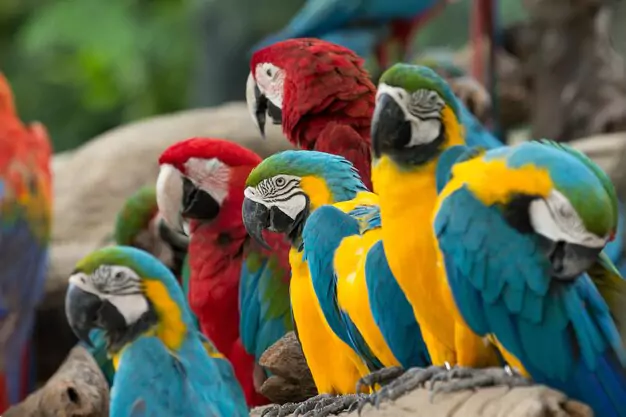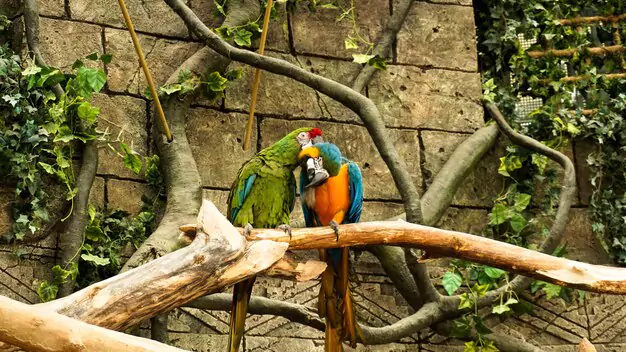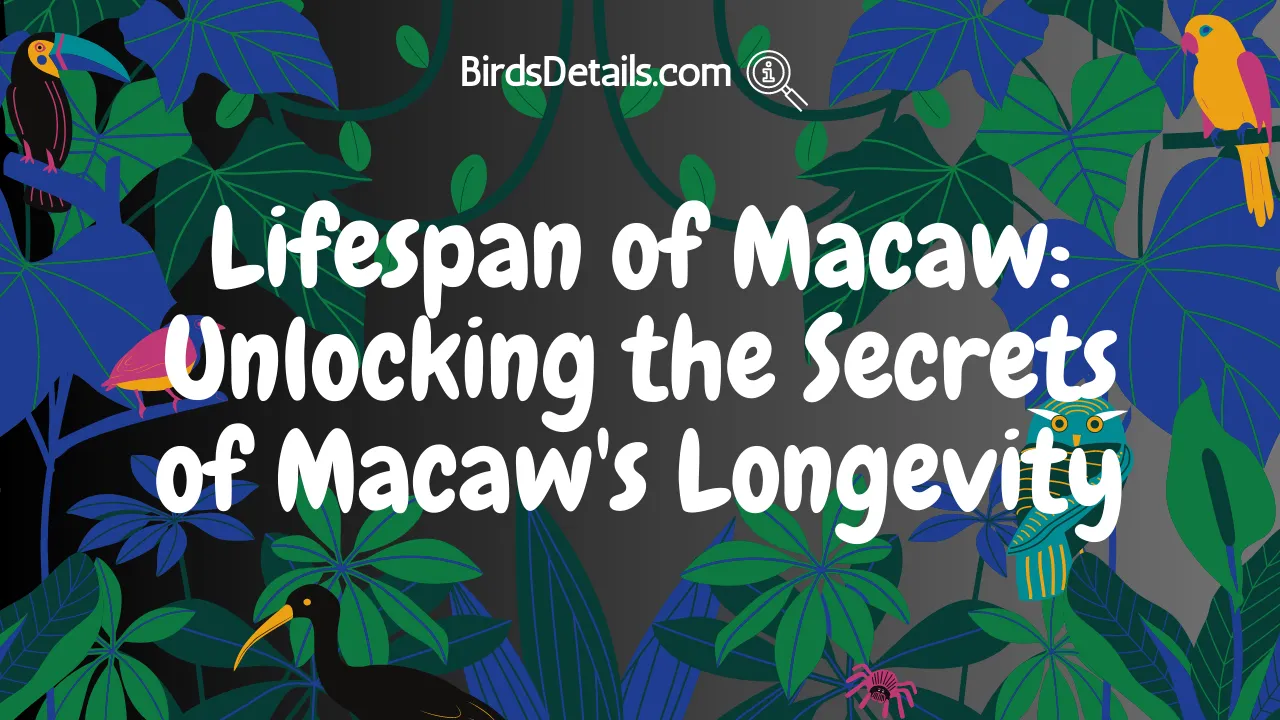The lifespan of a macaw can vary but typically ranges from 30 to 50 years. These vibrant and intelligent birds are known for their long lifespans and can be cherished companions for several decades.
Macaws are a family of colorful and long-lived parrots, known for their vibrant feathers and striking personalities. With a lifespan that can reach anywhere from 30 to 50 years, macaws are among the longest-living birds in the avian kingdom. Their longevity can be attributed to their natural habitat, as they thrive in rainforests and other tropical regions, providing them with a rich and diverse diet.
Additionally, the strong bond they form with their human caregivers and the careful care they receive can greatly contribute to their well-being and longevity. We will explore the factors that influence the lifespan of macaws and provide some helpful tips for ensuring their health and happiness throughout their lives.
Understanding The Average Lifespan Of Macaws

Macaws have an average lifespan of 60 to 80 years. They require proper care, a nutritious diet, and a spacious environment to thrive and reach their full potential. Understanding their lifespan helps us appreciate the long-term commitment involved in caring for these beautiful birds.
Macaws are known for their stunning colors, impressive size, and captivating personalities. These intelligent parrots make great pets and are fascinating creatures to observe. As a responsible bird owner, it’s crucial to fully comprehend the average lifespan of macaws, as well as the factors that contribute to their longevity.
In this section, we will delve into the factors affecting a macaw’s lifespan and compare it to other parrot species.
Factors Affecting Macaw’s Lifespan:
- Diet and nutrition: Providing a well-balanced diet rich in fresh fruits, vegetables, nuts, and high-quality parrot pellets is essential for the overall health and longevity of macaws. A nutritious diet ensures proper development, strengthens the immune system, and reduces the risk of diseases.
- Exercise and mental stimulation: Macaws are active birds that require plenty of daily exercise and mental enrichment. Regular physical activity, such as flying, climbing, and playing with toys, promotes muscle strength, bone density, and agility. Stimulating their intellect through puzzles, training sessions, and social interaction helps ward off boredom and enhances their well-being.
- Veterinary care: Regular visits to an avian veterinarian are crucial for maintaining a macaw’s health and detecting any potential health issues early on. Routine check-ups, vaccinations, and preventive treatments for parasites are essential in preventing and managing diseases that could impact a macaw’s lifespan.
- Environmental factors: Macaws thrive in a safe and enriching environment. A spacious and well-ventilated cage, free from harmful chemicals, provides them with a stress-free and comfortable living space. Exposure to excessive noise, temperature extremes, and toxic substances should be avoided to minimize health risks.
- Genetic predisposition: The genetic makeup of a macaw can influence its lifespan. Some genetic factors may increase the likelihood of certain health conditions, such as feather plucking, respiratory disorders, or immune system deficiencies. Responsible breeding practices and selecting healthy parent macaws can help minimize the risk of genetic diseases.
Comparing Macaw’s Lifespan To Other Parrot Species:
- Macaws are known for their exceptional lifespan among the parrot species. While it’s challenging to provide an exact number, with proper care and a suitable environment, macaws have the potential to live for several decades. On average, macaws can live anywhere from 30 to 50 years, with some individuals even reaching 60 years or longer in captivity.
- Compared to other parrot species, macaws surpass many in terms of longevity. For instance, smaller parrot species like budgies typically have an average lifespan of 5 to 10 years, while cockatiels can live for 15 to 20 years. African grey parrots, known for their exceptional intelligence, have a similar lifespan to macaws, averaging around 40 to 60 years.
- Worth noting is that lifespan can vary based on several factors, including the care provided, genetics, and individual health conditions. Some macaw species, such as the blue and gold macaw or scarlet macaw, tend to have longer lifespans compared to others.
- It’s important to acknowledge that a macaw’s lifespan is a commitment of considerable length. Prospective macaw owners should be prepared to provide the necessary care, attention, and resources for the entirety of their feathered friend’s life.
Understanding the factors that can influence a macaw’s lifespan is vital to ensure their well-being and longevity. By providing proper nutrition, mental stimulation, veterinary care, and a suitable environment, macaws can thrive and bring joy to their owners for many years.
Secrets Behind Macaws’ Longevity

Macaws have impressive lifespans, often living for 60 to 80 years. Their secrets to longevity lie in a combination of genetics, excellent nutrition, and a stress-free environment. With proper care, these vibrant birds can be cherished companions for decades.
Macaws are known for their vibrant plumage and striking appearance, but what truly sets them apart is their remarkable lifespan. These magnificent birds can live for several decades, with some species even reaching the impressive age of 80 to 100 years! So, what’s the secret behind their longevity?
Let’s explore the factors that contribute to the extended lifespan of macaws.
Diet And Nutrition For Macaws’ Health
Proper nutrition is essential for the well-being and longevity of macaws. These birds require a balanced diet that is rich in essential nutrients. Here are some key points to consider when it comes to macaw nutrition:
- Fresh fruits and vegetables: Macaws should consume a variety of fresh fruits and vegetables daily, including apples, bananas, carrots, and leafy greens. These provide vitamins, minerals, and antioxidants vital for their overall health.
- High-quality pellets: Macaws should also be provided with high-quality pellets formulated specifically for their species. These pellets offer a complete and balanced nutritional profile, ensuring that macaws receive all the necessary nutrients.
- Limited seed intake: While seeds are a natural part of a macaw’s diet, they should be given in moderation. Excessive seed consumption can lead to nutritional imbalances and obesity.
Physical Exercise And Mental Stimulation
In addition to a nutritious diet, macaws require regular physical exercise and mental stimulation to thrive. Here are some effective ways to provide them with both:
- Flight time: Macaws are highly active birds and need ample space to stretch their wings. Regular flight time in a safe and supervised environment allows them to engage in natural behaviors and maintain their physical fitness.
- Toys and puzzles: Macaws are intelligent creatures that benefit from mental stimulation. Providing them with a variety of toys and puzzles helps to keep their minds sharp and prevents boredom. Rotate the toys regularly to maintain their interest.
- Training and socialization: Macaws are highly trainable and enjoy learning new behaviors. Training sessions not only provide mental stimulation but also strengthen the bond between you and your feathered friend. Socialization with other macaws or compatible birds is also important for their emotional well-being.
Preventive Healthcare Measures
To ensure the longevity of macaws, preventive healthcare measures are crucial. Regular veterinary check-ups and proactive care can help identify and address potential health issues early on. Consider the following preventive healthcare measures:
- Regular vet visits: Schedule routine check-ups with an avian veterinarian who specializes in the care of birds. This allows for early detection of any health concerns and appropriate treatments.
- Vaccinations: Follow the recommended vaccination schedule for macaws to protect them against common avian diseases.
- Parasite control: Implement a parasite control program as recommended by your veterinarian to prevent infestations of external and internal parasites.
By prioritizing diet and nutrition, providing ample physical exercise and mental stimulation, and taking preventive healthcare measures, you can help ensure the long and vibrant life of your macaw companion. Remember, each macaw is unique, so it’s essential to consult with an avian veterinarian for personalized advice and care.
Now you have the key to unlocking the secrets behind the impressive longevity of macaws!
Promoting Macaws’ Long And Healthy Life

Macaws are known for their long lifespan, and promoting a healthy life for them is crucial. By providing a balanced diet, regular exercise, and a stimulating environment, macaws can live a long and fulfilling life.
Macaws are majestic and intelligent birds that can live for several decades if provided with proper care and a nurturing environment. To ensure that your macaw enjoys a long and healthy life, there are several key factors to consider. This section will delve into creating a suitable environment, building a strong bond with your macaw, and regular veterinary check-ups and care.
Creating A Suitable Environment:
- Provide a spacious cage: Macaws require enough space to move about and stretch their wings.
- Include natural perches: Using perches made of natural materials like wood helps maintain their foot health and provides mental stimulation.
- Offer a balanced diet: Include a variety of fresh fruits, vegetables, nuts, and formulated pelleted food to meet their nutritional needs.
- Stimulating toys: Provide macaws with toys that encourage mental and physical stimulation to prevent boredom and promote exercise.
- Avoid harmful substances: Keep your macaw away from toxic fumes, smoke, and certain household products that could be harmful to your health.
- Maintain suitable temperature and humidity: Ensure the environment is comfortable, avoiding extreme temperatures and maintaining an appropriate level of humidity.
Building A Strong Bond With Your Macaw:
- Spend quality time: Macaws are social birds, and spending time with them helps build a strong bond.
- Gentle handling: Handle your macaw with care, ensuring to avoid any actions that may cause stress or physical harm.
- Positive reinforcement: Use positive reinforcement techniques such as treats, praise, and rewards to encourage desired behaviors.
- Teach tricks and behaviors: Macaws enjoy learning new skills, so teaching them tricks can provide mental stimulation and strengthen your bond.
- Respect their personal space: While it’s important to interact with your macaw, also respect their need for alone time and personal space.
Regular Veterinary Check-Ups And Care:
- Find an avian veterinarian: Locate a veterinarian with experience in avian care who can provide regular check-ups and address any health concerns.
- Vaccination and parasite prevention: Follow the veterinarian’s advice on vaccinations and preventative measures to keep your macaw healthy.
- Maintain good hygiene: Clean the cage regularly, provide fresh water daily, and ensure a clean and hygienic living environment.
- Monitor behavior and health: Pay attention to any changes in the macaw’s behavior, appetite, appearance, or droppings, as these may indicate health issues.
- Provide mental and physical stimulation: In addition to diet, regular exercise and mental stimulation are essential to keep your macaw physically and mentally fit.
By creating a suitable environment, building a strong bond with your macaw, and providing regular veterinary check-ups and care, you can promote a long and healthy lifespan for your vibrant macaw companion. Remember, they rely on you for their well-being, so dedicate time and effort to ensure they live a happy and fulfilling life.
Frequently Asked Questions For Lifespan Of Macaw
Can Macaws Live 100 Years?
Yes, macaws have an average lifespan of 50 to 70 years, but some have been known to reach 100 years.
What Is The Lifespan Of A Macaw In Captivity?
The lifespan of a macaw in captivity ranges between 30 and 50 years. Macaws are known for their long life expectancy, and with proper care and nutrition, they can live for several decades. Captive macaws often have a longer lifespan compared to their wild counterparts due to reduced exposure to predators and a controlled environment that promotes their well-being.
Providing a balanced diet, regular veterinary check-ups, and a stimulating living environment are key to ensuring the longevity of macaws in captivity. Owners should also consider the commitment required to care for a macaw as they can outlive their human companions.
By meeting their physical, emotional, and social needs, macaws can thrive and enjoy a fulfilling life in captivity.
How Old Is The Oldest Macaw?
The oldest macaw is 105 years old. Macaws are known for their long lifespans in captivity.
Why Do Macaws Live So Long?
Macaws live so long due to various factors like their genetics, diet, and lifestyle. These vibrant birds possess exceptional longevity, thanks to their well-adapted DNA and robust immune systems. Their diet mainly consists of nutrient-rich foods, such as fruits, seeds, nuts, and vegetables, which provide them with essential vitamins and minerals necessary for their health and longevity.
Additionally, macaws engage in physical activities like flying and climbing, which promote strong muscles and reduce stress levels. Their social nature also contributes to their long lifespan, as they thrive in companionship. Regular veterinary check-ups and adequate care play a significant role in ensuring proper health and well-being, further enhancing their longevity.
By understanding these factors and providing the necessary care, macaw owners can expect their feathered friends to live a long and fulfilling life.
Conclusion
The lifespan of a macaw is something that every potential owner should carefully consider. These magnificent birds can live for several decades, with the potential to become lifelong companions. It’s important to provide them with a well-rounded diet, plenty of mental and physical stimulation, and regular veterinary check-ups to ensure they live long and healthy lives.
Macaws are highly intelligent creatures that require social interaction and a stimulating environment, so owners must devote time and attention to their needs. By investing in their care and providing a loving and nurturing home, the lifespan of a macaw can be extended, giving both the bird and its owner many years of enjoyment and companionship.
Consider the commitment and responsibility that come with owning a macaw, and you’ll be rewarded with a bond that can last a lifetime.








